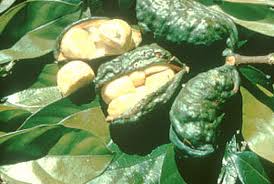Kolanut is one unique symbol that has stood valuable in the midst of the whole tribe of Nigeria. It is largely cultivated in the west, consumed in the north and valued high in the East. The kolanut is widely accepted as an honour in the welcoming of strangers and the saying goes that kolanut only understands local languages. That is, while breaking kolanuts for consumption, local languages are commonly used in the prayers of blessing that are associated with the presentation of kolanut.
In Igbo, kolanut is called "Oji". There are two different kinds of kolanut - "Gworo" and the "Oji-Igbo" - Igbo-kola). "Gworo has only two cotyledons while "Oji -Igbo" has varying cotyledons. The Igbo hold "Oji Igbo" in high esteem for reasons of traditional significance. The high estimation of "Oji Igbo" contributed to the attachment of meaning to its different cotyledons which changes for a single cotyledon to seven cotyledons. Single cotyledon is very difficult to come by in 'Oji Igbo". It is -abnormal and signifies abomination, hence finds no place in the usage of "Oji-Igbo" in Igbo land. Oji Igbo can have two cotyledons which is regarded as being "blind". Oji-Igbo with three cotyledons is regarded as 'Oji Nze" or "Oji Dike" (Kola nut for titled men). The commonest number of cotyledons that can be found in "Oji-Igbo" is four, which signifies the four markets in Igbo land; namely Eke, Orie, Afor and Nkwo. More so, seven cotyledons exist in "Oji-Igbo which signifies procreation and calls for celebration should any one breaks it. On pure traditional grounds, he who breaks such kola goes home with it.
The services involving kolanut is a cultural heritage of the Igbo which civilization cannot erase in Igbo land. It shows the happiness and love for another. This puts kola nut forward as the first thing, to be presented during occasions, settlement of disputes, etc. Kolanut shows good gesture over people and this makes the Igbo to say that "A child's face is appreciated first before one accepts the yam he has in his hands". "He who brings kola brings life" (Onye wetara oji wetara ndu), is a popular saying in Igbo land. Presentation and breaking of kolanut is something which cannot be dispensed with in Igboland. It marks a cordial welcome. Once present, it creates an avenue to appreciate the life God gave to the people, which is done before the kola is broken.
It should not be controversial about who breaks kola. In some areas of Igboland the tradition is such that the eldest man in any gathering has the right to break kola and in some areas, the youngest in a gathering breaks kola. It is noteworthy that the Igbo believe that kola does not understand English or other languages in a traditional Igbo setting; hence every prayer to be said on the kola presented must be in Igbo language. In a gathering devoid of men, the eldest woman at that gathering may have the privilege to break the kola but loses the privilege if a boy is in their midst. During the presentation of kola, it is not shown to women and grand children to the particular kindred in which the kola is provided. If the kola is shown to a grandson, he has every right to pocket it if he likes. Some of these restrictions are due to the high estimation of kola in Igboland.
Cordial reception is one of the things that the Igbo can be reckoned with. Presentation of kola to a visitor marks a cordial welcome. Where this is not done, attributed to unavailability of kola in the house, the host has it indicated by say thus -"My house is full of kola" which is the irony of the true situation. The Igbo serve kola because of its significance. Sometimes, when kola could not reach the people in a gathering, there is always the saying "Mbo aka O gara e bee, Oji ejighi zuo ora?" which means that the kola is supposed to be broken into smaller pieces as to reach the whole people in the gathering.
The process involved in the presentation of kola is much and wastes time when followed to the end. Kola passes from whoever brings it to his closest relation, who in turn, hands it over to somebody from a kindred next to his and the latter does the same. After the kola is being passed round, it is given to who it is due to break it. It should be noted that anybody in that gathering that misses the sequence of the presentation is charged to pay for the kola, because it is assumed that the kola is contaminated.
One of the greatest significance of kola nut is unity. Taking a close look at it from its state on its tree, a number of pods are held in a fruit stalk. Each pod contains a number of kola nuts and a number of cotyledons are unified together to form the kola nut. These are signs of unity. It should also be emphasized that the regard accorded to kolanut by the Igbo is such that there are some associated rules accompanying it. Tradition forbids a woman to climb kolanut tree. Secondly, women do not break kolanuts in the presence of their male counterparts, not matter the age, and are not shown kola in the midst of men when kola is presented.
Vitus Ejiogu is a writer and publisher with the Fire-Brand Int"l Ministries, a media ministry that is based in Nigeria.
He is the editor of FOUNDATION SATELLITE magazine also published by the ministry. He pastors a Church in Bauchi and is married with two children.
You can reach him at: firebrandhq@yahoo.com or, 234 802 8181 829. Website: http://azepanig.blogspot.com
Article Source: http://EzineArticles.com/?expert=Vitus_Ejiogu
Article Source: http://EzineArticles.com/5498247

